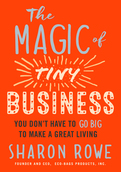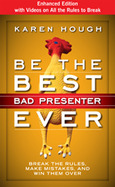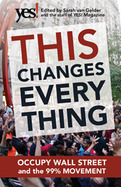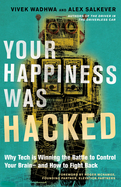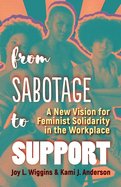—Seth Godin, author of Linchpin
Too many of us feel trapped by work that keeps us from living our purpose. We fantasize about starting our own business, yet we're warned against falling into debt, working eighty hours a week, and coping with the pressure to grow. Eco-Bags Products founder Sharon Rowe says there's another way: go tiny.
Like a tiny house, a tiny business is built on maintaining a laser focus on what is essential by living an intentional life. As an entrepreneur and mother, Rowe is most concerned with putting family first, maintaining financial security, and doing something that makes an impact in the world. Using the success story of Eco-Bags Products, Rowe distills the step-by-step process of building a profitable, right-scaled, sustainable venture that doesn't compromise your values. She shows you how to test your concept, manage your money and priorities, and more, while staying true to the "tiny" ethos.
2024
After experiencing two rare heart attacks at the age of 33—and a third a decade later, DeMarco knows trauma intimately. Trauma breaks your relationship with time by upending your expectations, fracturing your memories and identity, and destroying your innocence.
With poignant wisdom and refreshing insight DeMarco explodes traditional myths of resilience and shows what it takes to thrive through any of life's challenges. DeMarco situates meaningful challenge and loss specifically in the context of "lost innocence," and challenges common notions that we can think our way out of despair and back to a "normal" happy life when the unimaginable shatters it.
Leveraging advances in emotion science, somatic psychology, neuroscience, and trauma, Holding Onto Air brings the body and spirit into the solution, as much as the mind, and so presents a truly integrated, "whole person" approach to recovering from lost innocence and building resilience. It also makes spirit accessible for anyone of any background or belief—or no aligned belief.
More than a rudimentary map for navigating grief and loss' rocky terrain (with tired tropes and shop-worn strategies), DeMarco offers a unique and trusted guide for an arduous journey every human being will have to face—the realization of evil, pain, or mortality that occurs after a person experiences trauma.
This enhanced edition of Be the Best Bad Presenter Ever includes 13 exclusive videos that show you how to be a memorable, effective presenter by breaking all the rules. These videos offer a unique learning experience as author Karen Hough walks you through the good, the bad, and the ugly in the world of presentations. Watch as she and her colleagues model how to communicate ideas with care and authenticity, while poking fun at the ridiculous habits that are considered the norm in giving presentations.
* Shows how ripping up the traditional presentation dos and don'ts will make you a better, more relaxed, and more effective presenter
* Takes on over a dozen pieces of "good" presentation advice and reveals why they actually make you worse
* Features stories of people who not only were able to become great presenters by being "bad" but actually came to enjoy it
Gold Honoree, Benjamin Franklin Digital Book Awards
Most of us have received unhelpful advice like this before: cling to the podium, when in doubt use bullet-points, and suppress your nerves before they suppress you. Thankfully, Karen Hough debunks these myths and shows you how to be a presenter who makes a genuine connection with the audience--the type of connection that inspires people to take actionWith 25 minutes of lively and engaging video, this enhanced edition copy will change everything you thought you knew about presentations. Join Karen Hough as she teaches you how to be the best bad presenter you can be, so that what you say will actually make a difference.
With 25 minutes of lively and engaging video, this enhanced edition copy will change everything you thought you knew about presentations. Join Karen Hough as she teaches you how to be the best bad presenter you can be, so that what you say will actually make a difference.
If you're like most people, the phrase "You'll be giving a presentation" is on a par with "It looks like that molar will have to come out." Well, let's be honest: you'd prefer the surgery, wouldn't you?
One reason most people regard public speaking as a nightmare is that they have to be "perfect." They drive themselves crazy trying to conform to all sorts of handed-down rules that tie them up in knots and put their audiences to sleep. But Karen Hough knows that by throwing out those rules, relaxing, being yourself, and even making "mistakes," you'll connect with your audience much more effectively than the guy with the impeccable PowerPoint presentation.
Hough has used her unique approach to take the anxiety out of one of the greatest fears in business. It's authenticity and passion that win people over, she says, not polish. It's why people trust vlogs more than commercials and user reviews more than ads. But you can't be authentic if you're following constraining rules that drain the life and personality out of your presentation.
Hough debunks over a dozen myths about presenting to make it more fun and natural for everybody. She explains why mirrors are evil, why you should never end with questions, what the real purpose of any presentation should be, and much more. You'll discover how to embrace and develop your own style and communicate your message in a way that's all "wrong" according to the experts and that your audiences will find compellingly right.
If presentations really didn't matter, we'd all just send memos. There are a million ways to share information out there, but the more we digitize, the more we long for human connection. By following Karen Hough's wise and witty advice, you'll avoid being forced to become one more robot behind a podium and be freed to be a living, breathing, occasionally clumsy real person whose passion is powerful and infectious.
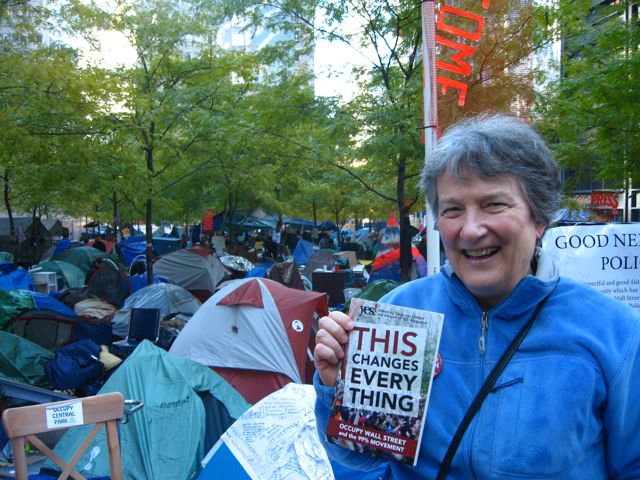
Fran Korten in front of Zuccotti Park in New York City with This Changes Everything
—Dean Ornish, M.D. Founder & President, Preventive Medicine Research Institute, Clinical Professor of Medicine, UCSF, Author, The Spectrum
Technology: your master, or your friend? Do you feel ruled by your smartphone and enslaved by your e-mail or social-network activities? Digital technology is making us miserable, say bestselling authors and former tech executives Vivek Wadhwa and Alex Salkever. We've become a tribe of tech addicts—and it's not entirely our fault.
Taking advantage of vulnerabilities in human brain function, tech companies entice us to overdose on technology interaction. This damages our lives, work, families, and friendships. Swipe-driven dating apps train us to evaluate people like products, diminishing our relationships. At work, we e-mail on average 77 times a day, ruining our concentration. At home, light from our screens is contributing to epidemic sleep deprivation.
But we can reclaim our lives without dismissing technology. The authors explain how to avoid getting hooked on tech and how to define and control the roles that tech is playing and could play in our lives. And they provide a guide to technological and personal tools for regaining control. This readable book turns personal observation into a handy action guide to adapting to our new reality of omnipresent technology.
Joy Wiggins and Kami Anderson advocate that the only way women can successfully support each other is by addressing the varying intersections of our individual power and privileges, particularly focusing on how some privileges are inherited along lines of race, class, sexuality, and geography. When we fully examine how we have power in certain situations and not in others, we start to see where we can lend privilege to create truly inclusive spaces for the historically underrepresented and marginalized.
Wiggins and Anderson look at how the dynamics of privilege and power have played out in the history of the feminist movement and identify and break down socialized behaviors and ideologies that trigger implicit bias and microaggressions. And they provide tools to interrupt negative thoughts and actions so women can nurture mutual support and show up as their authentic selves. Each chapter features a dialogue between them reflecting on how issues of race, privilege, and power have played out in their lives and their friendship.
The system of patriarchy has created an environment for women to knowingly and unknowingly sabotage each other—it is not inherent in women themselves. This book teaches us how to take an active approach to becoming better allies for each other and by so doing improve our world and end the cycle of injustice.


